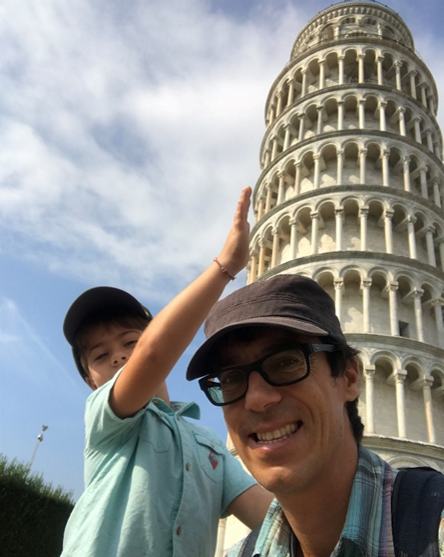by
Joaquim Vives, PhD
Contributing editor
Banc de Sang i Teixits
Barcelona, Spain
We are scientists and one thing scientists do is share the results of their research in international scientific meetings.
In September 2018, my wife planned to attend an EMBL conference in Heidelberg (Germany) while I would go to Florence (Italy) for the ISCT European Meeting. But we have young children …and difficult logistics. So, we decided to bring two of our three kids with us. She would go with Adrià (1 yo) and I would do the same with Gerard (7 yo). As a family, this was probably one of our best decisions ever. From this personal experience, I wanted to explore in this month’s Editorial the 5 biggest challenges faced by scientists with young children when attending scientific congresses abroad and suggest 5 possible strategies that organizers can employ to offer family-friendly events that would facilitate work-life balance for scientists who are also parents.
 |
 |
What an adventure for a Dad and son! Gerard joined an English Summer Camp during the day while I attended the scientific sessions and presented my poster. So glad organizers allowed him to see me delivering a two-minute elevator pitch and, of course, he was the centre of attention at the exhibitor’s hall
Five major challenges for scientists with young children planning to attend international conferences include:
- Childcare responsibilities: The foremost challenge for scientists with young children is childcare. International congresses often require scientists to be away from home for several days, altering the balance between professional commitments and responsibilities at home (1).
- Financial constraints: Attending international congresses can be expensive, with costs including registration fees, travel, accommodation, and meals. These financial burdens are even more substantial considering childcare or the need to bring their children along, which can further escalate expenses (2).
- Travel logistics: Traveling to international congresses can be a logistical nightmare for scientists with young children (e.g. finding reliable childcare in a foreign country, arranging safe and appropriate accommodations, managing time zone differences) (3).
- Limited presentation opportunities: International congresses often entail rigorous schedules, and parents may struggle to attend all the sessions they would like or find the time to present their research effectively… at a time of your career when it’s most needed, as an early stage professional, postdoc or group leader.
- Mental and physical well-being: Juggling the demands of scientific research and parenting can take a toll on the mental and physical health of scientists. The stress of trying to excel in both domains can lead to burnout, ultimately impacting on scientific productivity.
To address these challenges and promote inclusivity for scientists with young children, scientific congress organizers can consider implementing the following 5 strategies:
- Childcare services: Provide on-site or nearby childcare services during the congress and designate areas where parents can take care of their children comfortably and safely during the congress. This could include breastfeeding stations, play areas, and quiet rooms for naps or diaper changes (3, 4). Interestingly, some of these options are offered already in some conferences and symposia (i.e. EMBL, AAFS, ASCO, ESC, ESMO).
- Family-friendly policies: Offer discounted registration fees or travel assistance to scientists attending with their families and ensure that accommodations are family-friendly, with options for larger rooms or suites to accommodate parents and their children comfortably.
- Flexible Scheduling: Create more flexible schedules that allow for sessions at different times of the day. This would enable parents to choose sessions that align better with their childcare responsibilities and potentially participate in more activities during the congress. Alternatively, consider offering virtual attendance options for scientists who are unable to travel due to childcare obligations. This way, they can still engage with the scientific community and present their work remotely (5, 6).
- Networking Opportunities: Organize family-friendly events during the congress, such as family picnics, children's activities, and social gatherings that encourage both parents and their children to interact with colleagues in a relaxed environment.
- Mentoring and Support: Establish mentoring programs or support groups specifically for parents attending the congress. Experienced scientist-parents can offer guidance and advice on managing the challenges of balancing family life and a scientific career. Create a feedback mechanism for scientists to provide input on their experiences at the congress and suggest improvements to the family-friendly initiatives.
In summary, scientific congresses are invaluable opportunities for knowledge exchange, collaboration, and professional growth. To foster inclusivity and support scientists with young children, organizers of these events can implement family-friendly policies and initiatives that alleviate the challenges associated with balancing parenthood and a scientific career. By acknowledging and addressing the unique needs of scientist-parents, we can ensure that our scientific community is more diverse, equitable, and welcoming to all, regardless of their family responsibilities. In doing so, we not only enhance the experiences of scientist-parents but also enrich the overall scientific landscape.
References
- Sheffield V, Marcelin JR, Cortés-Penfield N. Childcare Options, Accommodations, Responsible Resources, Inclusion of Parents in Decision-making, Network Creation, and Data-driven Guidelines (CARING) at Infectious Disease Week (IDWeek): Parental Accommodations and Gender Equity. Clinical Infectious Diseases. 2020;72(12):2220-4.
- The Economic Cost of Attending Educational Conferences. IJonSES, 1(1), 30-42. 2019. https://ndownloader.figshare.com/files/16020854.
- Swann N. Are we there yet? eLife. 2019 2019/06/14;8:e49202.
- Calisi RM. Opinion: How to tackle the childcare-conference conundrum. Proc Natl Acad Sci U S A. 2018 Mar 20;115(12):2845-9. PubMed PMID: 29507208. Pubmed Central PMCID: PMC5866621.
- Chan A, Cao A, Kim L, Gui S, Ahuja M, Kamhawy R, et al. Comparison of perceived educational value of an in-person versus virtual medical conference. Canadian medical education journal. 2021 Sep;12(4):65-9. PubMed PMID: 34567306. Pubmed Central PMCID: PMC8463218.
- Ostler D, Steger J, Bernhard L, Yu K, Hartwig R, Feussner H, et al. "Hybrid" scientific conference: lessons learned from the digital annual meeting of the CARS international conference during the Covid-19 pandemic. Innovative surgical sciences. 2022 Jan 17;6(3):115-23. PubMed PMID: 35224179. Pubmed Central PMCID: PMC8826162.
#Feature
#Feature2
#feature4